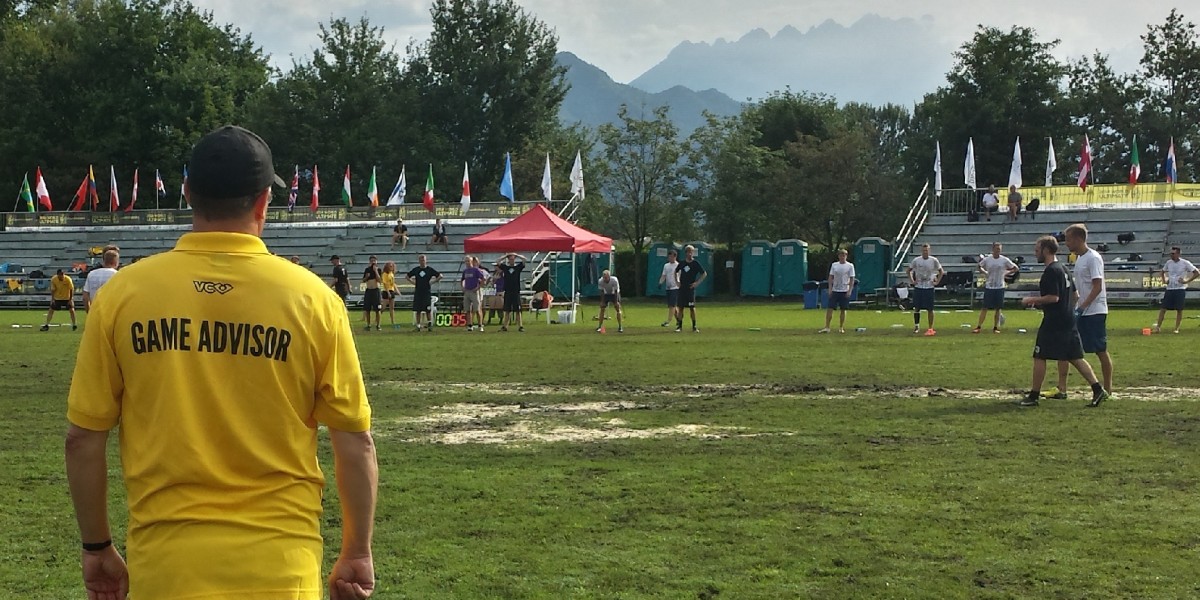
This tournament sees the first use of WFDF Game Advisors. The WFDF Spirit Task Force decided to implement Game Advisors to create an environment where the pace of the game could be improved but in a way that did not affect Spirit of the Game. In a call, the players still make the decision, but in a controlled and quick manner. In particular, Game Advisors will be used in games that are streamed or have a high level of exposure.
Reuben Berg, the Chair of the Task Force, told us that the implementation of the Game Advisors “has been very smooth,” with the assistance of USA Ultimate Observers. Of the five Advisors, four hail from the Observer system. WFDF have been able to “take on a lot of the USAU methods and leave out what we didn’t want.” This means that the relevant training, signaling, field positioning and knowledge of the correct rules was taken but without the element of stepping into a call to make a ruling. They are there to advise.
Some national representatives at the WFDF Congress on Saturday highlighted an interesting point about the applicability of Advisors in teaching ultimate in schools. They want to take the Advisors to the national level in their respective federations. That was not what WFDF intended for the Game Advisors until a review planned for after WUGC 2016. Reuben noted that he wanted “to take them back to Australia” but that they must be properly trained and should not be simply implemented straight away. This club event is a trial basis for these five Game Advisors, who will be working solely on the arena pitch.
Monday we had the two streamed games in the Open division, where historically we have had some contentious games (see Canada vs Japan at WUGC 2012). The first game (EMO vs Buzz Bullets) went very smoothly with only a handful of foul on the mark calls, which were quickly resolved on pitch. EMO players told me that 15 minutes before the game started, an Advisor came to them and explained to the whole team the Game Advisor role and told the players not to play any differently. We did see the players being more careful with offsides and pulling quickly which is the one of intended effects of the advisors. Greg Connelly, one of the Advisors and the USAU Observers told me that the game showcased their role very well. This moved the “focus onto the players that the observer system” does not have since the only advice they could give was line calls, up/down and time unless explicitly asked for rules advice. Just their “presence was enough.” Connelly mentioned that this was exactly how the Advisors should work to speed up calls and eventually play for a more representative and spirited version of our sport.
In the Otso vs Colony game, there was one moment where an Advisor stepped in, but just to clarify a call after a timeout was called. This again highlighted the advisory role and not as an interference with calls.
The Game Advisors have been brought to WUCC with very little logistical trouble and have started their trial effectively and fulfilling their intended role well. Of course, they have not been troubled yet and we shall see how any contention will be resolved in the coming days. Check out the arena pitch or the SkydMagazine.com livestream to see the Game Advisors in action.






Comments Policy: At Skyd, we value all legitimate contributions to the discussion of ultimate. However, please ensure your input is respectful. Hateful, slanderous, or disrespectful comments will be deleted. For grammatical, factual, and typographic errors, instead of leaving a comment, please e-mail our editors directly at editors [at] skydmagazine.com.